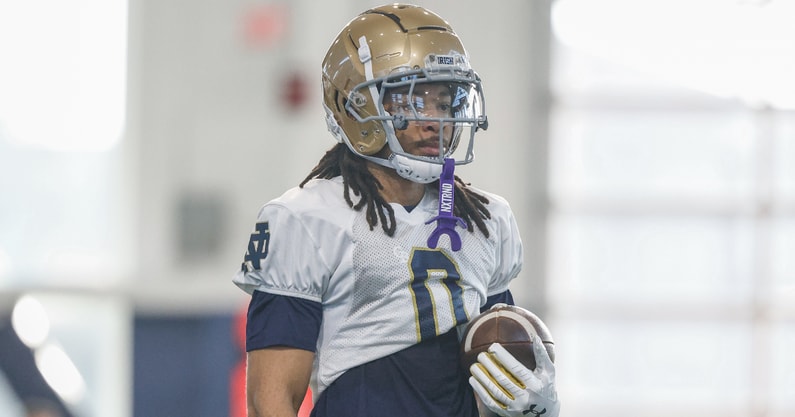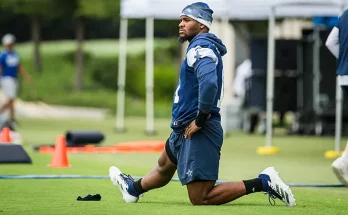The world of college football is often viewed through the lens of athletic achievement, where players rise to prominence based on their talent, work ethic, and results on the field. However, what often gets overlooked is the personal journey many of these athletes undergo – a journey that encompasses their development not just as football players but as young adults, navigating the pressures of academics, family, identity, and their futures.
For Devonta Smith, the decision to transfer from Alabama to Notre Dame ahead of the 2024 season wasn’t merely about making a move for more playing time or chasing accolades; it was about finding a place where he could grow in every aspect of his life. As the starting nickel back for Notre Dame’s 2024 defense, Smith’s journey reflects a deeper narrative about personal transformation and finding one’s path, both on and off the field.
A Glimpse into Devonta Smith’s Early Life and Career
Devonta Smith’s story begins in Baton Rouge, Louisiana, where he grew up playing multiple sports and quickly developed a deep love for football. Throughout his youth, it was clear that Smith had the athleticism and drive to excel at the next level. By the time he reached high school, he was already a standout player, earning attention from college scouts across the country. His journey to becoming a highly regarded recruit for Alabama seemed inevitable, but it was his experiences off the field that would eventually shape his decision to move.
Smith’s time at Alabama was filled with success. He enrolled in Nick Saban’s prestigious program, known for its excellence and discipline. There, he contributed to a team that regularly competed for national championships and produced some of the best athletes in the country. Throughout his first few years, Smith’s talent on the field shone through. He was fast, tough, and adaptable – all the traits necessary for a player in the nickel back position, where speed and versatility are essential to shutting down opposing offenses. However, while football provided him with incredible opportunities, it was clear that something deeper was missing for Smith at Alabama.
The Struggles Behind the Scenes: Why Devonta Smith Transferred
As successful as Smith’s time at Alabama was on the field, it was off the field where he began to encounter challenges. College football at a program like Alabama is a high-pressure environment. With a rigorous academic schedule, demanding training sessions, and the constant expectation to perform at the highest level, athletes can often find themselves struggling to maintain balance in their lives. For Smith, the desire for personal growth and fulfillment began to outweigh the allure of playing for one of the most successful programs in college football history.
While many players at Alabama were content with the structure and opportunities provided, Smith found himself questioning his purpose. He had begun to feel isolated – not necessarily from his teammates, but from the sense of community and belonging that he truly craved. The combination of intense football obligations and the social pressures associated with being a student-athlete at a high-profile program took a toll on him. He felt a disconnect between the person he was becoming and the environment he was in.
The decision to transfer wasn’t a reflection of Alabama’s program or coaching staff but rather Smith’s desire to explore a new environment where he could grow in all aspects of his life. He needed a fresh start, a place where he could not only excel on the football field but also find personal peace and a sense of belonging.
Smith reached out to several programs that would offer him the opportunity to continue his career while also giving him the chance to redefine his personal path. His decision to choose Notre Dame was ultimately rooted in the values the program represented.
The Role of Notre Dame in Devonta Smith’s Decision
One of the driving factors behind Smith’s transfer to Notre Dame was the program’s balance between football success, academic excellence, and a strong sense of community. Notre Dame’s reputation for providing a well-rounded experience – one that prioritizes faith, education, and holistic development – stood out to Smith. He had always believed that the college experience should offer more than just football and academics; it should be a place where he could mature as a person, be challenged intellectually, and contribute to something larger than himself.
For Smith, the decision to transfer to Notre Dame was about more than just a football opportunity – it was about finding a place that aligned with his personal values. He felt that the culture at Notre Dame would offer him the chance to grow spiritually and emotionally, while also excelling on the field. The program’s emphasis on academic success, community involvement, and character development resonated with him deeply. As a young man still figuring out his identity, Smith felt Notre Dame was a place where he could not only excel as a football player but also as a person.
Marcus Freeman, the head coach of Notre Dame, played a significant role in making Smith feel welcome and supported. Freeman’s leadership style, which focuses on building a strong culture and fostering personal development, was exactly what Smith needed at this stage in his life. Freeman’s dedication to supporting his players on and off the field, along with his vision for the future of Notre Dame football, convinced Smith that this was the right place for him to continue his journey.
The Impact on Notre Dame Football
On the field, Devonta Smith’s addition to the Notre Dame defense for the 2024 season provides an immediate upgrade at the nickel back position. Known for his versatility, speed, and high football IQ, Smith is expected to make an immediate impact on one of the most crucial positions in Marcus Freeman’s defense.
In today’s college football landscape, where offenses are constantly evolving, the nickel back role has become essential to defending against the pass-heavy offenses that dominate the game. Smith’s ability to cover wide receivers, step up against the run, and provide leadership in the defensive backfield gives Notre Dame a versatile and reliable option. His football acumen and athleticism make him an ideal fit for Notre Dame’s defense, which has always prided itself on being adaptable, aggressive, and fundamentally sound.
More than just his skills as a football player, Smith brings a certain level of leadership and maturity to the Notre Dame locker room. Having experienced the pressure of playing at a top-tier program like Alabama, Smith knows what it takes to succeed on the biggest stages and can provide invaluable guidance to younger players who are just beginning their college football journey. His experience at Alabama has made him a seasoned veteran, and he will be able to help shape the development of the Irish secondary in the years to come.
The Bigger Picture: Smith’s Personal Journey and the Legacy He Will Leave Behind
While Devonta Smith’s football abilities are undoubtedly impressive, what stands out most is the journey he has taken to get to this point. Smith’s decision to transfer to Notre Dame represents a personal quest for fulfillment, growth, and alignment with his values. In many ways, it exemplifies the modern college athlete’s search for purpose beyond the sport.
Smith’s journey highlights an important message for the college football world: the well-being of athletes should always be prioritized, and it’s essential for players to find a program that supports not just their athletic development, but also their mental, emotional, and spiritual growth. As college football continues to evolve, players like Smith will inspire others to pursue opportunities that offer more than just football success.
Through his transfer to Notre Dame, Devonta Smith is demonstrating that success is not always measured in titles or stats but in personal growth and fulfillment. His decision will resonate with many future student-athletes who face similar challenges in finding their own path, both on and off the field.
Ultimately, Smith’s story is about much more than football. It’s about finding a place where he can excel, contribute to a community, and continue to grow into the person he aspires to be. As he embarks on his final season of college football, Devonta Smith is not just playing for a team; he’s playing for his future, his values, and his journey of self-discovery.
The 2024 season may just be the beginning of a new chapter for Smith, both as a football player and as a person. And as his story continues to unfold, one thing is certain: his journey is far more significant than football alone.



